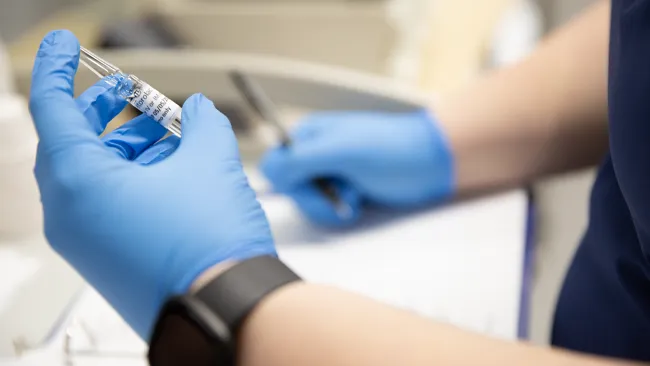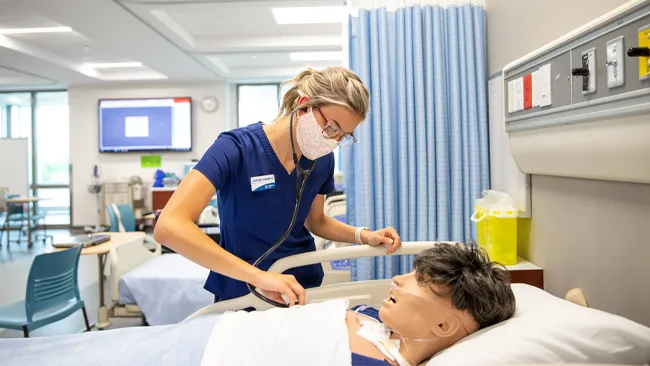
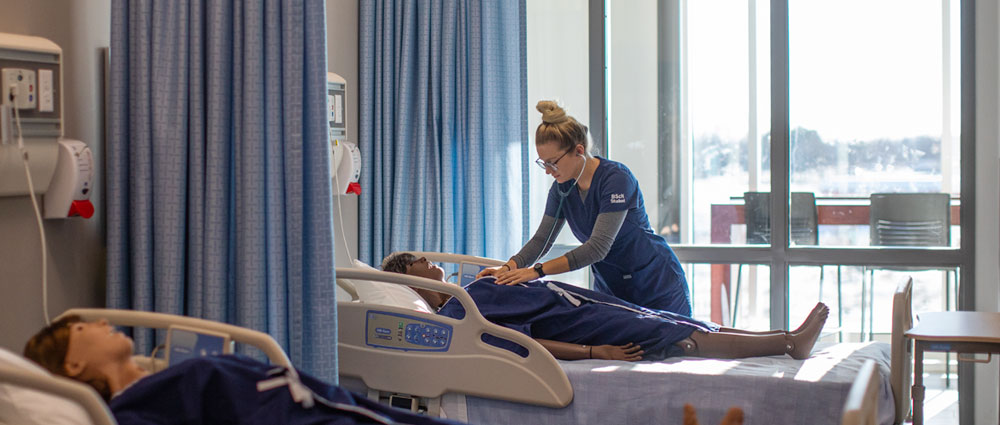
Honours Bachelor of Science - Nursing
Overview
Let Lambton College prepare you to navigate the evolving and dynamic challenges of the Canadian healthcare system and complete all four years of the Honours Bachelor of Science - Nursing program right in Sarnia.
Lambton College’s four-year Honours Bachelor of Science - Nursing Degree prepares graduates to navigate the evolving and dynamic challenges of the Canadian healthcare system.
The program of study is grounded by theoretical concepts in the art and science of nursing and prepares students to practice according to the highest standards of quality and service delivery defined by the profession of nursing. The program offers clinical experiences across eight terms with 600 hours of integrated practicum in year four. Students will be prepared to meet or exceed the entry to practice competencies required by the College of Nurses Ontario (NCO).
Students in this program will develop the critical thinking and clinical reasoning skills required for success in a fast-paced healthcare environment. Students will learn to analyze issues from multiple perspectives and engage in inter-professional practice to build a foundation for achieving successful careers practising across the healthcare sector. Furthermore, students will learn how research advances the practice of nursing and is an indispensable component of a graduate's transition to professional practice. Lambton County's unique location in the province as a border city and home to three Indigenous communities also provides students with opportunities to engage in international and national exploration of health and healthcare issues.
Safe, interactive experiential learning opportunities take place in the NOVA Chemicals Health & Research Centre which features state-of-practice simulation labs. Lambton College nursing students experience hands-on learning that encourages advanced skill acquisition preparing them for real world clinical practice. The culmination of this excellence in nursing education ensures graduates will be equipped to be responsive to the complex needs of individuals, families, communities, and populations across the province.
Admission Requirements
O.S.S.D. or equivalent with:
Six level 4 courses from the U or M stream and an overall average of 70% minimum including:
- Grade 12 English U*
- Grade 12 Mathematics C, U, or M
- Grade 12 Biology U (SBI4U)**
- Grade 12 Chemistry U (SCH4U)**
*minimum grade of 65% required
**minimum combined average of 70% for Chemistry and Biology
From Pre-Health Sciences Pathway to Advanced Diplomas & Degrees
- Program GPA of at least 2.7 (70%)
- A combined average of at least a B- (70%) in BIO-1205 and BIO-1055
- A combined average of at least a B- (70%) in CHM-1255 and CHM-2255
- Passing grade in all courses in both terms
Students in this program must apply to the BSNL program by February 1 of the calendar year in which they wish to be considered for admission to start the program to ensure all additional requirements are met for the BSNL program.
Mature Students
Demonstrated evidence of completion of the required course with the required averages listed above either through secondary education or upgrading activities.
Transfer Credit
Students who are seeking transfer credit approval must have a minimum final grade of 70% in each course and the course must be completed within the last five years at the time of submitting the transfer credit application. Visit Transfer Opportunities to begin this process.
Academic admission requirements can be obtained through Academic Upgrading and the Pre-Health Sciences Pathway to Advanced Diplomas & Degrees (PHDP) program at Lambton College. All course requirements must be completed no later than the first day of classes of term one.
Highly Competitive Program
This is a highly competitive program and students are encouraged to apply by February 1 - the equal consideration deadline.
Based on the 2023-2024 Admission Cycle, the following data should be considered by future applicants to this program:
Number of students in program
Number of applicants who received an offer
Admission average for first-round offers
Average a direct applicant needs to receive an offer
Ontario's Learn & Stay Grant
This new grant launched in the Spring of 2023. Students entering the first or second year of either the Bachelor of Science - Nursing or Practical Nursing programs have the opportunity to receive full, up-front funding for tuition, books, and other direct educational costs.
To receive this grant, you are required to work in the region where you studied for a minimum of six months for every year you were funded by the grant.
Costs
- Year 1 $7,373.64
- Year 2 $7,287.72
- Year 3 $7,350.24
- Year 4 $7,350.24
Please Note: These fees apply to the 2024-2025 academic year and are subject to change. Fees do not include books (unless specifically noted), supplies or living costs.
Additional Fees
-
Textbooks and Digital Software - annual fee$1,200.00
-
CPR & First Aid - recertification is $75 annually$200.00
-
Mask Fit Testing - annual fee$40.00
-
Name Tag & Chest Patch with coloured stripe$25.00
-
Uniforms (2)$180.00
-
Duty Shoes - all white or black leather - no mesh or cloth$170.00
-
Watch - with second hand$70.00
-
Stethescope - Littmann Classic 3 or more advanced$200.00
-
Lab kit - second year$200.00
-
Lab kit - third year$200.00
-
Blood Pressure Cuff$50.00
-
Parking, Printing, etc$1,200.00
-
Police Records Check, Vulnerable Persons Check - annual fee or term fee$25.00
-
Non-Violent Crisis Intervention/SMG - annual fee$60.00
-
Penlight$10.00
Travel Expenses
Students are responsible for all costs associated with traveling to clinical placements.
Scholarships Available
There are 8 scholarships available for this program, with a total value of $1,000!
Technology Requirements
In order to keep pace with the requirements of each and every course in your program, Lambton College requires that each student have access to a laptop while studying at our college.
Labs & Equipment
Courses
Anatomy & Physiology 1
In this course, the first of two in the program, the student is introduced to the study of human anatomy and physiology, systematically exploring the structure and function of the human body. Learners examine the concepts associated with the integumentary, skeletal, muscular, nervous, endocrine, and blood systems with a focus on material that is essential for clinical application.
Introduction to the Nursing Profession
This course, the first in a series of three professional nursing courses in the program, introduces learners to the foundations of nursing s a profession. Using the 4 metaparadigms of nursing as a framework, learners explore fundamental nursing knowledge including historical, philosophical, theoretical, and scientific underpinnings; nursing education; and the Canadian health system to understand how current Canadian nursing organizations, issues, and standards influence the profession of nursing. Foundational concept knowledge of the nursing process; principles of primary health care including health promotion, health protection, and client education; the determinants of health; and person-centered care, foster critical thinking.
Fundamental Skills Labs
This onsite experiential learning lab prepares learners with fundamental clinical knowledge, the foundation for clinical judgment and critical thinking, and practical skills to provide personal care for a client across the lifespan, and applies new and concurrent course learning into interactive activities using simulated clients.
Clinical 1 - Professional Communtion & Self-Awareness
In this clinical experience, the first of six in the program, learners develop the foundations of relational practice in nursing through the examination of communication, reflection, and self-knowing skills required for relational practice. Learners explore the principles of therapeutic communication, critical thinking, and team dynamics. Through group work, learners develop a teaching plan and deliver education about infection control and handwashing in the community. As well, learners apply skills (e.g., Gentle Persuasive Approach, Non-violent Crisis Intervention) to simulated situations designed to prepare learners to mitigate conflict and threats to the safety of self and others. Critical analysis of personal and emerging nursing practices aids learners in valuing reflective practice as a means for life-long learning and professional growth. Integration of new, concurrent, and prior learning is essential for success.
Critical Inquiry & Scholarly Writing for Nursing
In this course learners develop academic reading, writing, and critical thinking skills through understanding, discussing, researching, and writing about a variety of research topics focused on relationships between ecology, nature, and society. By analyzing and comparing texts and writing argumentative essays, learners develop academic writing and critical reading skills that upport their future academic work and prepare them to communicate effectively in professional settings. Current APA style must be applied to all writing. Integration of new, concurrent, and prior learning is essential for success.
Development Across the Lifespan
Using a developmental psychology lens, this course provides learners with an opportunity to improve their understanding of self and others through both traditional (lecture) and innovative mediums (Graphic Novel, Gamification, Small Group discussion). Learners will examine the human lifespan from prenatal development through to death and grieving. Learners discuss development of intelligence, language, self, identity, personality, gender, and morality across biological, cognitive, psychosocial, and emotional contexts. Moreover, they will examine the socio-cultural contexts of development including family relations, peer groups, community and friendship.?Examination of fundamental theories and current issues specific to Canada (and Indigenous Peoples), in addition to diversity and epigenetics provides learners with opportunities for critical thinking regarding the influences on one's own growth and development as well as adding to the student's co-curricular record (through completion EDI mini courses).
Anatomy & Physiology 2
In this course, the second of two in the program, students continue to study human anatomy and physiology, systematically exploring the structure and function of the human body. Learners examine the concepts associated with the cardiac, lymphatic, respiratory, digestive, and urinary systems, as well as principles of fluid and electrolyte balance, acid-base balance, and genomics with a focus on material that is essential for clinical application.
Professional Nursing & Ethical Practice
In this course, the second of three in professional nursing, learners expand upon their professional development, with a focus on ethical issues impacting health care (e.g., confidentiality, informed consent, equity and social justice, power imbalances, medical assistance in dying). Ethical, professional, and legal concepts and theories inform the developing professional nurse as they examine moral, ethical, legal, and regulatory nursing knowledge and responsibilities in relation to current practice. Integration of new, concurrent, and prior learning is essential for success.
Holistic Health Assessment
In this course, learners acquire knowledge and skills in the holistic assessment of individuals across the lifespan, with emphasis on the adult population. The focus is to develop the role of the nurse as clinician by obtaining knowledge and skills necessary for competence in health history interviewing, physical examination, interpretation of normal and abnormal findings, and documentation with application occurring in the Lab and Clinical settings. Integration of new concurrent, and prior learning is essential for success.
Clinical 2 - Introduction to the Clinical Setting
This clinical experience, the second of six, introduces learners to the hospital environment with a focus on the clinical aspects of personal care, health assessment, and documentation. Learners provide all aspects of personal care to a client, complete a health history, perform physical assessments, formulate nursing diagnoses, develop nursing care and client education plans, evaluate care, and document care provided. Through relational practice, learners consider the influence of psychological, sociocultural, spiritual, cultural diversity, and previous trauma in client care. In addition, learners must demonstrate ethical and evidence-informed clinical decision-making within a practice setting. Learners participate in a high-fidelity simulation in the Human Simulation Lab to enhance learning and challenge critical thinking within a safe environment. Integration of new, concurrent, and prior learning is essential for success.
General education elective change to Degree Level Non Core Elective (advanced)
Pathophysiology Concepts & Nursing Care 1
In this community course, the first of three, learners focus on the role of community and public health registered nurses in health promotion and health protection activities within communities, schools, and groups. Learners recognize the influence of social, political, and economic determinants of health on community health and well-being. Learners explore models of care delivery, health promotion and health protection theories relevant to community assessment and development, and program planning, implementation and evaluation. In addition, learners will examine the care and advocacy of the older person focusing on health promotion, illness prevention, and the coordination and management of care for these clients to enjoy optimal quality of life while aging in place or transitioning to community-based long-term care settings. Integration of new, concurrent, and prior learning is essential for success.
Statistics for Nursing Research
This course, the first of three in research, focuses on basic statistics and introduces learners to qualitative data used in social and biological sciences. There is an emphasis on understanding the fundamental application of health research data. The course will prepare entry-level baccalaureate nurses with the knowledge to conduct and interpret descriptive and inferential statistics.
Introduction to Pharmacology
In this course, learners examine the theory and principles of pharmacology as it relates to nursing practice, providing the requisite knowledge to administer medications in a safe, ethical, and legal manner. Learners explore various categories of medications examining the use, standard dosages, potential adverse events, and nursing responsibilities in medication administration. In addition, learners explain the importance of client education for the safe use of medications. Integration of new, concurrent, and prior learning is essential for success.
Clinical 3 - Labs
This clinical experience, the third of six courses, continues in the hospital environment with a focus on integrating new knowledge and skills learned in concurrent courses and previous clinical experiences with performance expectations increasing across all aspects of nursing practice. The weekly experiential lab component prepares learners with knowledge to perform selected nursing skills (e.g., basic and complex wound care, injections, medication administration, catherization, specimen collection) and discuss ultural care and humility through interactive activities. In the clinical environment, learners provide all aspects of personal care to a client, including holistic health assessments, safe medication administration, care interventions (e.g., wound care, catheterization), develop nursing care and client teaching plans, and documentation of all care performed. Through relational practice, learners demonstrate caring and therapeutic relationships with clients. In addition, learners must demonstrate ethical and evidence-informed clinical decision making within the practice setting. In addition, simulation-based learning experiences are offered in the nursing labs as opportunities for learners to apply their cognitive, psychomotor, and affective skills in a safe, supportive environment. Simulation experiences are authentic to practice and are intended to provide experience in anticipation of practice in the clinical setting. Each simulation applies theoretical concepts related to learning outcomes and objectives of the course.
Microbiology - Infectious Disease & the Immune Response
This course introduces learners to the field of microbiology. Learners distinguish between bacteria, viruses, fungi, and protozoa and their structure, classification, microbial growth, and genetics. Learners discuss epidemiology of diseases, extent of host involvement, genomic influence in pathogenicity, and the immune system response to infections. Learners will learn approaches to microbial infection control and will study common infections affecting different organ systems. Integration of new, concurrent, and prior learning is essential for success.
Community 1 - Introduction to Community Nursing & Aging in Place
In this community course, the first of three, learners focus on the role of community and public health registered nurses in health promotion and health protection activities within communities, schools, and groups. Learners recognize the influence of social, political, and economic determinants of health on community health and well-being. Learners explore models of care delivery, health promotion and health protection theories relevant to community assessment and development, and program planning, implementation and evaluation. In addition, learners will examine the care and advocacy of the older person focusing on health promotion, illness prevention, and the coordination and management of care for these clients to enjoy optimal quality of life while aging in place or transitioning to community-based long-term care settings. Integration of new, concurrent, and prior learning is essential for success.
Research & Evidence - Informed Practice
This course, the second of three in nursing research, examines the purposes and processes of nursing and health-related research. Learners improve upon previously used information and communication technologies (ICT) search strategies and develop critical appraisal skills to examine quantitative and qualitative research evidence. Learners explore clinical questions and relevant studies to understand how research translates into clinical practice. Prior learning in Statistics for Nursing Research enhances learners' understanding and application of data collection methods to research questions in published health journals and reports.
Mental Health & Addictions
This course examines the nursing knowledge, attitudes, and skills that learners need to promote and maintain mental health and wellness across the lifespan. This course focuses on comprehensive cognitive and mental health assessments; crisis intervention and prevention; herapeutic communication techniques/skills; and the promotion of positive mental health outcomes. Using principles of physiology, pharmacological and non-pharmacological interventions, and collaborative practice, learners discuss quality client care through a trauma and violence-informed lens. Case-based discussions and simulations prepare learners to employ critical thinking and evidence-informed clinical judgement to plan safe and professionally competent care. Integration of new, concurrent, and prior learning is essential for success.
Clinical 4 - Labs
This clinical experience, the fourth of six, continues in the hospital environment and expands into the community with a focus on integrating new knowledge and skills learned in concurrent courses and previous clinical experiences with performance expectations increasing across all aspects of nursing practice. The weekly experiential lab component prepares learners with knowledge to perform selected nursing skills (e.g., blood administration, NG insertion, ostomy care, IV medications, mental health communication techniques), perform skills related to community nursing practice, and discuss cultural care and humility through interactive activities. In the clinical environment, learners provide all aspects of personal care to a client, including holistic health assessments, safe medication administration, care interventions (e.g., mental health communication techniques, additional technical skills), develop nursing care and client teaching plans, and documentation of all care performed. Through relational practice, learners demonstrate caring and therapeutic relationships with clients. In addition, learners must demonstrate ethical and evidence-informed clinical decision-making within the practice setting. In addition, simulation-based learning experiences are offered in the nursing labs as opportunities for learners to apply their cognitive, psychomotor, and affective skills in a safe, supportive environment. Simulation experiences are authentic to practice and are intended to provide experience in anticipation of practice in the clinical setting.? Each simulation applies theoretical concepts related to learning outcomes and objectives of the course.
Introduction to Sociology
Sociology is the scientific study of society. This course is a general introduction to the concepts, theories, and major perspectives of sociology. An examination of research studies drawn from Canada and beyond our borders will highlight the significance of using a sociological imagination. Students in this subject will also be involved in the science of sociology by developing their own sociological research proposal.
Pathophysiology Concents & Nursing Care 2
This course, the second of three in pathophysiology concepts and nursing care, focuses on aspects of human disease and the clients' experiences with acute and chronic health variations of increasing complexity. Learners examine the structural and functional changes of cells, tissues and organs, using program health concepts (e.g., perfusion, gas exchange, cellular and hormonal regulation, nutrition, inflammation, infection, tissue integrity, mobility, sensory protection, fatigue), and relevant diagnostic tests to explain clients' signs and symptoms and how selected diseases impact each of the body systems. Learners employ the nursing process to facilitate critical thinking and clinical reasoning in discussing the therapeutic management of health variations. Integration of new, concurrent, and prior learning is essential for success.
Community 2 - Public & Population Health
In this course, the second of three in community and public health, learners examine epidemiological, environmental, and global health issues while considering the impact of globalization on specific populations and settings with a focus on current and complex issues in population health affecting Canada and other countries. Learners analyze the social, political, and economical determinants of health and how they are addressed in the current context and, through upstream thinking and equity and social justice initiatives, how to decrease their negative influences on health. In addition, learners discuss emergency preparedness and disaster management in the community, population, and global context. Integration of new, concurrent, and prior learning is essential for success.
Young Families Health - Maternal Infant Care
In this course, learners focus on the nurse's role in meeting the health care needs of young and growing families. Learners examine the nursing care of the maternal-child-family unit during the antenatal, perinatal, and postpartum period. In addition, learners examine the nursing care of infants, children, and youth. Learners apply the principles of family-centred care, health promotion and protection, growth and development, and trauma-informed care to support critical thinking and evidence-informed clinical judgement in planning for safe and competent care of young families. Integration of new, concurrent, and prior learning is essential for success.
Clinical 5 - Labs
This clinical experience, the fifth of six, focuses on caring for multiple clients in a variety of clinical areas and community settings with performance expectations increasing across all aspects of nursing practice. In the experiential learning lab, the fifth of eight, prepares learners to perform selected nursing skills (e.g., chest tubes, trach care, chest tubes, post-partum assessment, newborn assessment, pediatric dosage, and pediatric medication administration). In the clinical setting, learners provide all aspects of personal care to a client, including holistic health assessments, safe medication administration, care interventions, develop nursing care and client teaching plans, and documentation of all care performed. Through relational practice, learners demonstrate caring and therapeutic relationships with clients. In the community, learners work with clients, families, and groups across various levels of care. Learners must apply knowledge of the determinants of health and primary health care principles according to the Canadian Community Health Nursing Standards of Practice, Public Health Ontario Standards of Practice, and other associated standards within the placement setting. Learners are expected to establish and maintain collaborative community relationships/partnerships and utilize practical experience to move toward independent practice. In addition, learners must demonstrate ethical and evidence-informed clinical decision making within the practice setting. Learners participate in a high-fidelity simulation in the Human Simulation Lab to enhance learning and challenge critical thinking within a safe environment. Integration of new, concurrent, and prior learning is essential for success. Simulation-based learning experiences are offered in the nursing labs as opportunities for learners to apply their cognitive, psychomotor, and affective skills in a safe, supportive environment. Simulation experiences are authentic to practice and are intended to provide experience in anticipation of practice in the clinical setting. Each simulation applies theoretical concepts related to learning outcomes and objectives of the course.
Equitable Health Outcomes for Indigenous Peoples and Responsible Healthcare Practice
In partial fulfillment of the Truth and Reconciliation Commission of Canada (TRCC) Call to Action 24 and other health-related Calls to Action, this course provides foundational learning for healthcare providers to be able to provide equitable, non-discriminatory care to Indigenous peoples. Learners will analyze how historical, political, economic, and social forces, including settler colonialism and assimilation practices, have shaped the health and well-being of Indigenous communities today. Learners will critique the Social Determinants of Health looking at the impacts of settler colonialism, including structural and systemic barriers, inequitable healthcare services, and misconceptions about Indigenous peoples. Learners will look to Indigenous rights frameworks, and the unique rights of Indigenous peoples to understand the necessity of Indigenous peoples' self-determination in their health and well-being. Lastly, learners will have meaningful opportunities to reflect on and critique the roles and responsibilities of the healthcare professions and healthcare professionals in addressing settler colonialism and different levels of racism that impact Indigenous peoples. Upon completion of the course, learners are encouraged to pursue additional development opportunities related to Indigenous health and well-being. The integration of previous and concurrent program knowledge is essential for success.
Pathophysiology Concepts & Nursing Care 3
This course, the last of three in pathophysiology concepts and nursing care courses, focuses on aspects of human disease and the clients' experiences with critical or life-threatening health variations. Learners examine the structural and functional changes of cells, tissues, and organs using health and illness concepts and relevant diagnostic tests to explain clients' signs and symptoms and how selected diseases impact each of the body systems. In addition, learners examine the fundamental knowledge including definitions, concepts, evidence-informed best practices, and the provision of palliative and end-of-life care. Learners employ the nursing process to facilitate critical thinking and clinical reasoning in discussing the therapeutic management of health variations. Integration of new, concurrent, and prior learning is essential for success.
Nursing Research in Community, Population and Environmental Health
This course intersects nursing research and community health, where learners discuss issues in community, public health, population, and global health affecting the local community, the region, or population of Canada, and identify gaps in the current health care evidence. Guided by faculty, learners critically appraise community-based health research evidence and use the principles of community-based research to analyze the social, political, and economical determinants of health in a community. Connecting with key stakeholders and community partners, learners complete a community health assessment for a population or group and, through upstream thinking and equity and social justice principles, and propose a plan for research to address health disparities and improve health outcomes. Integration of new, concurrent, and prior learning is essential for success.
Clinical 6 Plus Labs
This clinical experience, the last of 6, continues learners' experience focusing on caring for multiple clients in a variety of clinical areas and community settings with performance expectations increasing across all aspects of nursing practice. In the experiential lab, learners to perform selected nursing skills (e.g., advanced wound care, central line management, parenteral nutrition, blood gas analysis, basic ECG interpretation) and to apply relational practice skills using simulated clients. In addition, learners complete palliative assessments, and participate in a simulated disaster. In the clinical setting, learners provide all aspects of personal care to a client, including holistic health assessments, safe medication administration, care interventions, development of nursing care and client teaching plans, and documentation of all care performed. It is an expectation that learners will be able to provide complete care and documentation for a minimum of two clients by the end of the term. Through relational practice, learners demonstrate caring and therapeutic relationships with clients. In the community, learners work with clients, families, and groups across various levels of community with a greater emphasis on population health and safety. Learners must apply knowledge of determinants of health and primary health care principles and standards associated within the placement setting. Students are expected to establish and maintain collaborative community relationships/partnerships and utilize practical experience to move toward independent practice. In addition, learners must demonstrate ethical and evidence-informed clinical decision making within the practice setting. Integration of new, concurrent, and prior learning is essential for success. In addition, simulation-based learning experiences are offered in the nursing labs as opportunities for learners to apply their cognitive, psychomotor, and affective skills in a safe, supportive environment. Simulation experiences are authentic to practice and are intended to provide experience in anticipation of practice in the clinical setting. Each simulation applies theoretical concepts related to learning outcomes and objectives of the course.
Degree Level Non-Core Breadth Elective (higher level)
Professional Nursing Leadership
This course, the last of three on professional nursing, focuses on the principles of management and leadership in the delivery of healthcare. An overview of leadership and management theories assists the student in understanding the principles involved in the key skills employed by highly successful nurse leaders (e.g., critical thinking, effective communication and conflict resolution, the art of delegation, team building, resource management, policy development, continuous quality improvement, change leadership, stress management). Seminar-style group discussions require learners to hone skills specific to the nursing profession's role in leadership within our current and envisioned future healthcare system. In addition, learners discuss current issues and trends in nursing leadership and management, and the contribution of the professional nurse to society. Integration of new, concurrent, and prior learning is essential for success.
Experiential Learning - Transition to Practice 1
This experiential learning course, the first of two in transition to practice, facilitates transition of the learner from the role of nursing student to the role of professional nurse. Through praxis seminars and simulation activities, learners consolidate program learning in the pursuit of entry-to-practice competence in preparation for registration exams and independent professional practice as a registered nurse. Topics include a review of selected health variation, health promotion, and health protection assessments and interventions; and the ethical, legal, political, professional and interprofessional issues, as they relate to professional accountability and safe, competent, and compassionate nursing practice. Learners participate in low and high-fidelity simulation in the Human Simulation Lab to enhance learning and challenge critical thinking within a safe environment. Integration of new, concurrent, and prior learning is essential for success.
Integrated Hospital Practicum
This clinical experience is one of two precepted clinical experiences that enables the pre-graduate nursing student to synthesize theory, research, and professional and technical skills in clinical nursing practice. Learners must integrate concurrent and prior learning to continue to deliver competent, safe, ethical, and evidence-informed practice. The expected learner outcome is to practice at a proficient nursing student level with a comprehensive acquisition of entry-to-practice competencies identified by the College of Nurses of Ontario. Based on learner interests, individual learning needs, and career goals pre-graduate nursing students practice in the hospital setting. Integration of new, concurrent, and prior learning is essential for success.
Integrated Community Practicum
This clinical experience is the second of two precepted clinical experiences that enables the pre-graduate nursing student to synthesize theory, research, and professional and technical skills in clinical nursing practice. Learners must integrate concurrent and prior learning to continue to deliver competent, safe, ethical, and evidence-informed practice. The expected learner outcome is to practice at a proficient nursing student level with a comprehensive acquisition of entry-to-practice competencies identified by the College of Nurses of Ontario. Based on learner interests, individual learning needs, and career goals, pre-graduate nursing students practice in the community setting. Integration of new, concurrent, and prior learning is essential for success.
Leadership & the Future of Nursing
In this capstone course, the last of three in nursing research, learners apply a critical lens and the perspective of a scholarly professional in the examination of trends and issues in nursing that are influencing the profession. Professional nursing roles, health care systems and nursing practice issues such as intra- and inter-professional collaboration, social justice, nursing regulation, and professional associations are just a few of the topics that learners can select to research and develop a plan for innovation, quality improvement and/or change. Integration of new, concurrent, and prior learning is essential for success.
Experiential Learning - Transition to Practice 2
This experiential learning course, the second of two in transition to practice, facilitates transition of the learner from the role of nursing student to the role of professional nurse. Building upon the skills gained in Transition to Practice 1 and through praxis seminars and simulation activities, learners continue to consolidate program learning and strengthen entry-to-practice competence in preparation for registration exams and independent professional practice as a registered nurse. Learners engage in employment readiness and career search skills. Review of selected health variation, health promotion, and health protection assessments and interventions; and ethical, legal, political, professional and interprofessional issues as they relate to professional accountability and safe, competent and compassionate nursing practice continues. Integration of new, concurrent, and prior learning is essential for success.
Integrated Hospital Practicum
This clinical experience is one of two precepted clinical experiences that enables the pre-graduate nursing student to synthesize theory, research, and professional and technical skills in clinical nursing practice. Learners must integrate concurrent and prior learning to continue to deliver competent, safe, ethical, and evidence-informed practice. The expected learner outcome is to practice at a proficient nursing student level with a comprehensive acquisition of entry-to-practice competencies identified by the College of Nurses of Ontario. Based on learner interests, individual learning needs, and career goals pre-graduate nursing students practice in the hospital setting. Integration of new, concurrent, and prior learning is essential for success.
Integrated Community Practicum
This clinical experience is the second of two precepted clinical experiences that enables the pre-graduate nursing student to synthesize theory, research, and professional and technical skills in clinical nursing practice. Learners must integrate concurrent and prior learning to continue to deliver competent, safe, ethical, and evidence-informed practice. The expected learner outcome is to practice at a proficient nursing student level with a comprehensive acquisition of entry-to-practice competencies identified by the College of Nurses of Ontario. Based on learner interests, individual learning needs, and career goals, pre-graduate nursing students practice in the community setting. Integration of new, concurrent, and prior learning is essential for success.
OntarioLearn Courses
Students are required to take non-core (non-nursing related) courses through OntarioLearn. Please be sure to check you Program Map on you mylambton homepage in order to determine which level of course you are required to take - degree level or degree level advanced.
Progression Requirements

Students considering the Bachelor of Science - Nursing program, should be aware that there are minimum grade requirements in order to pass courses within this program.
A passing grade of 65% is required for all core nursing courses with the exception of:
- PSYC-1403 Development Across the Lifespan
- Courses offered only through OntarioLearn
Contact
Program Information
School of Nursing
After Graduation
Employment Opportunities
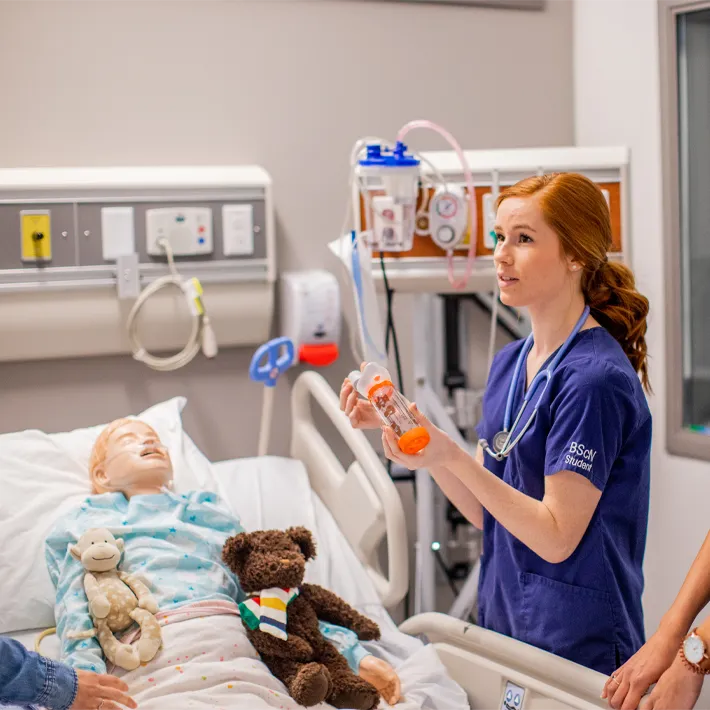
Registered Nurses have many career options open to them as they are prepared to care for individuals, families, and communities in varied settings. Our graduates assume roles as clinical practitioners, health program and policy developers, researchers, administrators and teachers. Careers can be found in hospitals, community health agencies, public health units, government health agencies and public and private corporations in both urban and rural settings.
Completion of Lambton College's BSNL degree is recognized by several post-secondary institutions across Canada as an approved pre-requisite program to pursue graduate education at a Master's level.
Accreditations & Certifications
Registered Nurse Licensing
The completion of a BSNL degree prepares you for obtaining licensure as a Registered Nurse. Upon completion of the program, students will complete the NCLEX (National Council Licensure Examination for Registered Nurses) registration exam and a jurisprudence exam in the province, territory or state in which you choose to work.
These exams cost an estimated $1,000.
Master's Degree
Students may pursue a Master's degree in nursing or a related field at any university of their choosing.
In order to pursue a Master's degree, you must obtain a minimum of 70% - 75% average in your Bachelor's degree work to be considered for entry to a Master's program.
Placement
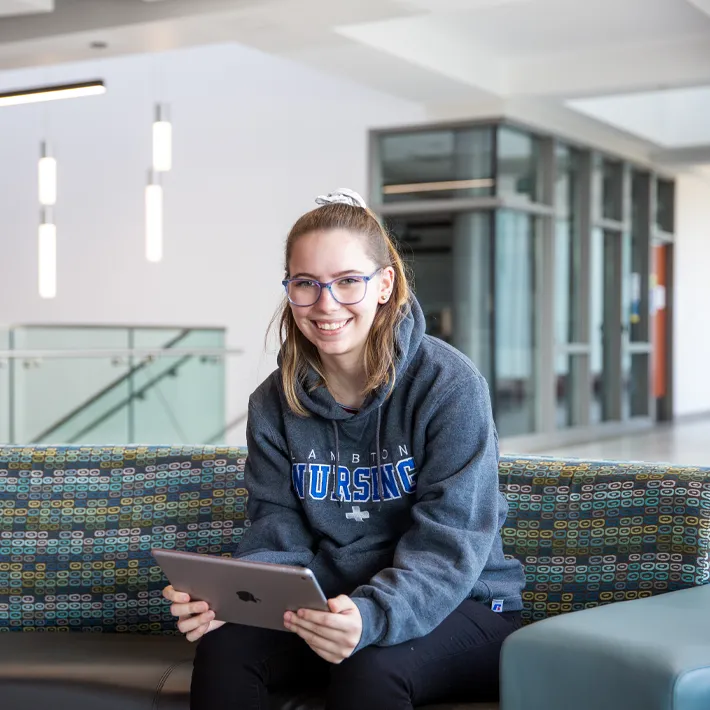
Vaccinations & Police Record Checks
Students considering this program should be aware that there may be field and clinical placement requirements. Many placements require students have proof of certain vaccinations and police record checks.
Once you’ve applied, you can log in to mylambton.ca and view the program-specific Field & Clinical Placement Requirements. If you need information about these requirements before applying, please contact placementinfo@lambtoncollege.ca.
Placement Courses
Students are to complete the opposite clinical practicum in Term 8 of what was taken in Term 7. Each student must complete both BSNL-4977 and BSNL-4987 to be eligible to graduate.
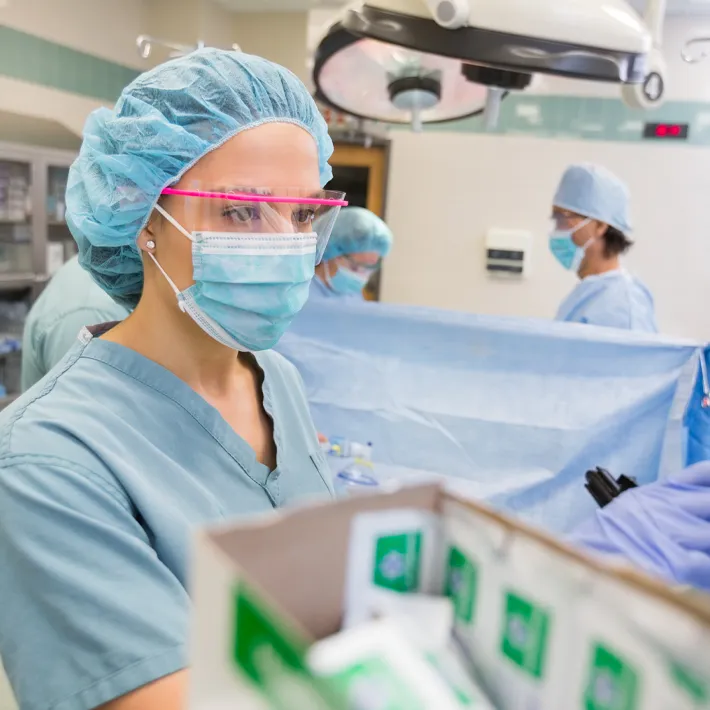
More Information
Technology Requirements
It is recommended that students purchase a laptop with a Windows operating system.
Internet Speed Requirements
For best performance for students learning remotely, an internet connection with a minimum of 40 Mbps download and 10 Mbps upload speed is recommended in order to effectively use video conferencing and remote lecture delivery software as well as, other online resources remotely. Due to the large area over which students may be dispersed, we are unable to recommend a specific provider, so you will need to inquire around your area to find one that best suits your needs.
Minimum Laptop Requirements
In order to access the internet and virtually-delivered software and courseware, student laptops should include the following at a minimum. By meeting the following specifications, students will be equipped to access software and courseware on their laptop through the internet:
- Intel i5 8th Gen Processor or equivalent
- 16 GB of RAM (with a minimum of 8 GB)
- 100 GB HDD or more
- HD Graphics
- Webcam with a microphone
- Wireless 802.11n/ac 5ghz capable
- Windows Operating System (Windows 11)
Please note that Chromebooks and MacBooks may not support all software required for your program; students should verify compatibility with their professors.
Software
To ensure students are getting the most our of their classroom experience, some software will be required.
Lambton College has made this software easily accessible online. Students can leverage our Microsoft Office 365 software packages and services. In addition, much of the software you require for your courses will be available on demand for use on any device - on or off campus.
